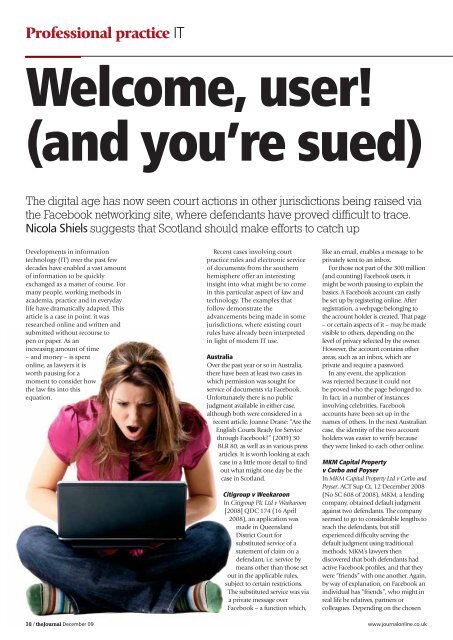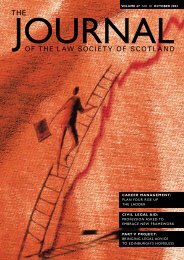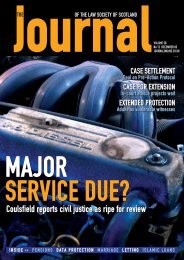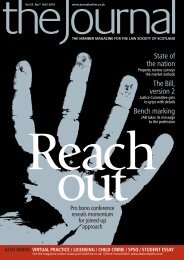Professional briefing - The Journal Online
Professional briefing - The Journal Online
Professional briefing - The Journal Online
Create successful ePaper yourself
Turn your PDF publications into a flip-book with our unique Google optimized e-Paper software.
<strong>Professional</strong> practice IT<br />
Welcome, user!<br />
(and you’re sued)<br />
<strong>The</strong> digital age has now seen court actions in other jurisdictions being raised via<br />
the Facebook networking site, where defendants have proved difficult to trace.<br />
Nicola Shiels suggests that Scotland should make efforts to catch up<br />
Developments in information<br />
technology (IT) over the past few<br />
decades have enabled a vast amount<br />
of information to be quickly<br />
exchanged as a matter of course. For<br />
many people, working methods in<br />
academia, practice and in everyday<br />
life have dramatically adapted. This<br />
article is a case in point: it was<br />
researched online and written and<br />
submitted without recourse to<br />
pen or paper. As an<br />
increasing amount of time<br />
– and money – is spent<br />
online, as lawyers it is<br />
worth pausing for a<br />
moment to consider how<br />
the law fits into this<br />
equation.<br />
38 / the<strong>Journal</strong> December 09<br />
Recent cases involving court<br />
practice rules and electronic service<br />
of documents from the southern<br />
hemisphere offer an interesting<br />
insight into what might be to come<br />
in this particular aspect of law and<br />
technology. <strong>The</strong> examples that<br />
follow demonstrate the<br />
advancements being made in some<br />
jurisdictions, where existing court<br />
rules have already been interpreted<br />
in light of modern IT use.<br />
Australia<br />
Over the past year or so in Australia,<br />
there have been at least two cases in<br />
which permission was sought for<br />
service of documents via Facebook.<br />
Unfortunately there is no public<br />
judgment available in either case,<br />
although both were considered in a<br />
recent article, Joanne Drane: “Are the<br />
English Courts Ready for Service<br />
through Facebook?” (2009) 30<br />
BLR 80, as well as in various press<br />
articles. It is worth looking at each<br />
case in a little more detail to find<br />
out what might one day be the<br />
case in Scotland.<br />
Citigroup v Weekaroon<br />
In Citigroup Plc Ltd v Weekaroon<br />
[2008] QDC 174 (16 April<br />
2008), an application was<br />
made in Queensland<br />
District Court for<br />
substituted service of a<br />
statement of claim on a<br />
defendant, i.e. service by<br />
means other than those set<br />
out in the applicable rules,<br />
subject to certain restrictions.<br />
<strong>The</strong> substituted service was via<br />
a private message over<br />
Facebook – a function which,<br />
like an email, enables a message to be<br />
privately sent to an inbox.<br />
For those not part of the 300 million<br />
(and counting) Facebook users, it<br />
might be worth pausing to explain the<br />
basics. A Facebook account can easily<br />
be set up by registering online. After<br />
registration, a webpage belonging to<br />
the account holder is created. That page<br />
– or certain aspects of it – may be made<br />
visible to others, depending on the<br />
level of privacy selected by the owner.<br />
However, the account contains other<br />
areas, such as an inbox, which are<br />
private and require a password.<br />
In any event, the application<br />
was rejected because it could not<br />
be proved who the page belonged to.<br />
In fact, in a number of instances<br />
involving celebrities, Facebook<br />
accounts have been set up in the<br />
names of others. In the next Australian<br />
case, the identity of the two account<br />
holders was easier to verify because<br />
they were linked to each other online.<br />
MKM Capital Property<br />
v Corbo and Poyser<br />
In MKM Capital Property Ltd v Corbo and<br />
Poyser, ACT Sup Ct, 12 December 2008<br />
(No SC 608 of 2008), MKM, a lending<br />
company, obtained default judgment<br />
against two defendants. <strong>The</strong> company<br />
seemed to go to considerable lengths to<br />
reach the defendants, but still<br />
experienced difficulty serving the<br />
default judgment using traditional<br />
methods. MKM’s lawyers then<br />
discovered that both defendants had<br />
active Facebook profiles, and that they<br />
were “friends” with one another. Again,<br />
by way of explanation, on Facebook an<br />
individual has “friends”, who might in<br />
real life be relatives, partners or<br />
colleagues. Depending on the chosen<br />
www.journalonline.co.uk










